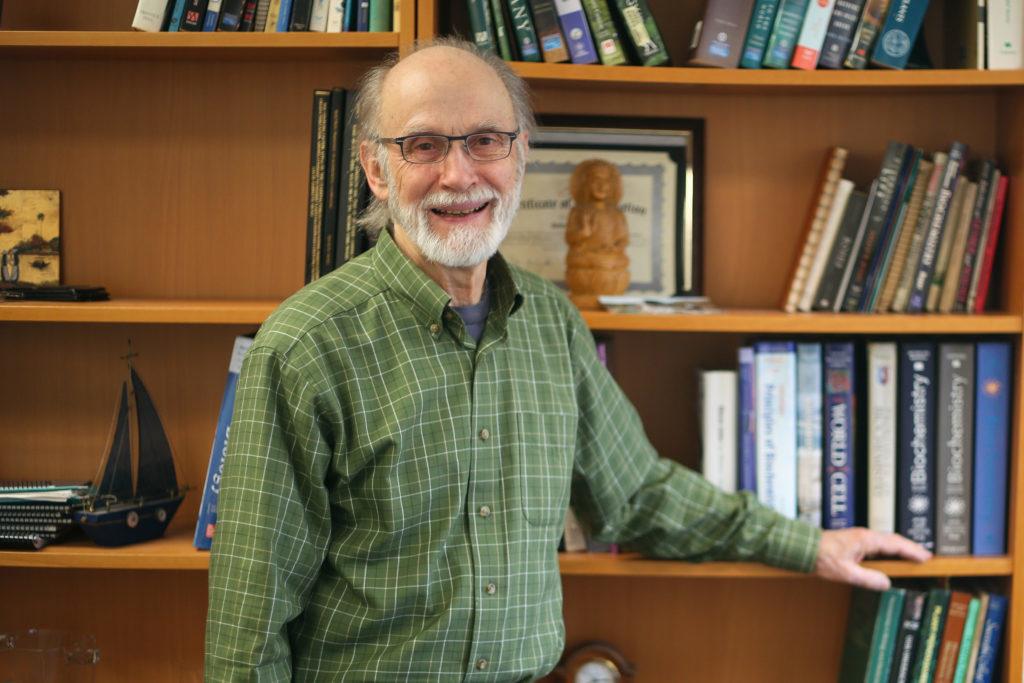Robert Donaldson never expected to lead the biology department – but 41 years after he began teaching at GW, more than a quarter of his time has been spent in the position.
Donaldson’s first stint as chair started by chance. It was the mid-1990s, and the position was up for grabs – but he was campaigning for another candidate and helping her develop new ideas for the department. The night before the election, the candidate called Donaldson to tell him she had too much on her plate to take on the responsibility and urged him to vie for the role – and he did.
He ended up serving as chair for nine years until the mid-2000s and began a second spell two years ago when the position opened up again. But at the end of this semester, Donaldson – who is also a professor of biology – will retire after more than four decades at GW.
“Talking to people, working with people, I enjoy that,” Donaldson said, talking about what he’ll miss most at GW. “Helping the faculty with desires, wants, problems. Hearing about all of the fascinating, interesting things that the biology faculty and students do.”
Donaldson plans to relocate to a small town in Colorado and spend time with his family after he retires, but he said he will miss teaching and conducting research at GW.
Growing up with two microbiologist parents, Donaldson has had a lifelong interest in biology and went on to study the subject at the University of Texas at Austin, Miami University of Ohio and Michigan State University.
During his tenure at GW, Donaldson, who specializes in plant physiology and biochemistry, said he encouraged undergraduates to become more involved in research initiatives and pressed for more faculty hires in the department.
“I started setting up research projects in labs here in Bell Hall, and I was really lucky to get several students who started working with me right away on research,” he said. “That helped me get the research started – students working with me.”
Donaldson was the co-director of a $1.7 million research grant awarded to the biology department in 2002 to help create projects like a computational molecular biology concentration and an undergraduate research course.
“These research opportunities were meant for freshmen to give them a few courses that could prepare them for the possibility of preparing research and seeing research opportunities firsthand,” he said.
Throughout his career, Donaldson said he prioritized research that bolstered undergraduate participation – an overall goal of research officials in recent years.
During his tenure, Donaldson also developed the Scholars in Quantitative and Natural Sciences initiative, an intensive research program for freshmen to work closely with faculty. The program offers a curriculum of four courses including a special research lab, computer science programming, bioinformatics and biology-focused physics courses.
“It’s kind of related to STEM – it encompasses that,” he said. “It’s not laboratory sciences like biology and chemistry but also mathematical sciences like math and computer science.”
But Donaldson also faced difficulties in his time as chair. With limited faculty in the biology department, he said majors are often forced to wait extensive periods of time to take required classes because there are limited sessions offered.
“We need more graduate students, more faculty,” he said. “The main thing about this institution is to serve undergraduate students – there’s more of them and they pay a lot of money to go here.”
Donaldson’s colleagues said they admire him for his enthusiasm about research and biology and his creative teaching style.
John Lill, an associate professor of biology, who will take over as department chair starting June 1, said Donaldson played an integral role in emphasizing research opportunities for undergraduates at the introductory level. As chair, Donaldson also developed three concentrations in the biology department in 2016: cell and molecular biology, general biology and ecology, and evolution.
“He is a cheerleader for the department,” Lill said. “He was also really proactive in getting a lot of undergraduates involved in research.”
James Clark, a professor of biology and former chair, said it is unfortunate to see Donaldson leave because of his commitment to research, which was clear in projects he started like the Harlan Undergraduate Research Fellowship, a summer program for undergraduates to conduct laboratory research in biology-related fields.
“Professor Donaldson contributed to just about every area in which it is possible to contribute: research, administration, teaching, establishing interdepartmental connections and obtaining external funding,” he said.





